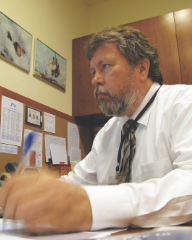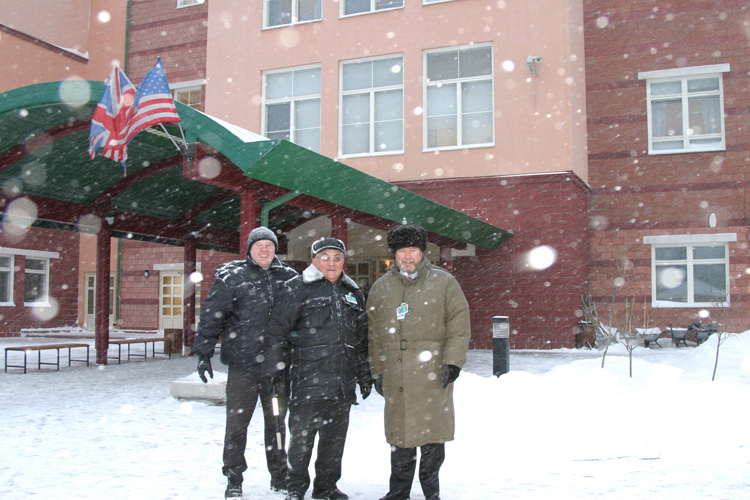Article by William Scarborough, formerly at Canadian Academy
Feature image: Scarborough's photo of Angkor Wat, a temple in Siem Reap, Cambodia.

William Scarborough,
formerly at Canadian Academy in Kobe, Japan
When my wife and I first decided to take the plunge and accept a position outside the United States, I never imagined we would be packing up for our final international move 20 years later in Kobe, Japan, with a pandemic complicating every step. Now, all these years later, I am so glad we made that first move. As I spend the final few months of my overseas career working from my apartment, a 10-minute walk from the school employing me, the situation has given me the chance to reflect on how fortunate I have been to spend two decades overseas working at excellent educational institutions in four countries in Eastern Europe and Asia.
I spent the first 20 years of my working life in higher education business offices, 10 with the University of North Carolina at Chapel Hill and 10 with Duke University. Then I became aware of the possibility of working abroad. I was reading the Wall Street Journal and saw a job listing for an international school system in Saudi Arabia and thought, “That sounds just like what I am doing now.” Though my wife Martha and I decided against moving to Saudi Arabia, I applied for the position of director of finance and operations at the Anglo-American School of Moscow. My family moved there in June of 2000, and shortly thereafter our son entered third grade. After five years in Moscow, we moved to the American International School of Bucharest in Romania for three years, and then to Singapore American School, where we stayed for nine years. We moved to Kobe, Japan, for our final adventure.
In general, international schools serve a country’s non-citizen, expatriate population, offering the chance for their children to be educated in their home-country curriculum, or at least in a compatible curriculum. While I recommend nonprofits, there are also chains of for-profit schools which offer German, French, British and American curricula, as well as international curriculum such as the International Baccalaureate. Such schools are increasingly popular in today’s interconnected world, and in some countries local families also find them an attractive option. If well run, they can be truly inspiring places to work and learn. Our lives, and particularly our son’s, were deeply enriched by the diversity and opportunities offered by these schools.
Responsibilities for finance and operations leaders in overseas international schools are much like those in U.S. independent schools. They include overseeing finance and budgeting, human resources, risk management, legal affairs, facilities management, security, admissions, and food and bus services. Of course, between different countries and systems there are wide variances in labor and tax laws, security needs, availability of quality materials and services, regulations and legal processes as well as the reliability of written contracts, banking and currency exchange, import regulations, and health care for staff. Consequently, each assignment involved its own unique circumstances. For me, the need to be continuously learning and adapting made working overseas challenging, rewarding and never boring.
While being far from our families and home country was at times difficult, the opportunity to live and travel in new cultures — and the salary to afford this — made the trade-off a positive one.
In terms of personal benefits, the schools I’ve worked for have all provided a competitive salary, car, roundtrip flights home once a year for the family, shipping of household goods both ways, a retirement contribution, free tuition for faculty and senior staff children, and rich professional development opportunities. My working calendar provided nine to 11 weeks of holidays annually that coincided with school vacations, allowing our family to travel together. Different countries and schools may afford different benefits, but in general, for administrative positions in respected and established international schools, these are fairly standard. While being far from our families and home country was at times difficult, the opportunity to live and travel in new cultures — and the salary to afford this — made the trade-off a positive one.
It was, in fact, this enjoyment of living outside our comfort zone that made us stay overseas for so long. The four countries we temporarily called home were all different and all fascinating.

Russia in the 2000s was still awakening from its Soviet past. The Anglo-American School of Moscow, with 1,200 students, was sponsored by the embassies of the U.S., United Kingdom and Canada. My office was in the U.S. Embassy, which was a unique experience. Living in Moscow, we sampled the great Russian, Uzbek and Georgian foods, visited world-class museums, walked to Red Square and the Kremlin from our apartment, and made full use of the beautiful Metro system. St Petersburg, where we operated a second school of just 150 students, was beautiful and fascinating.
In some ways, our stay in Bucharest was even more of an adventure. Romania then was in the process of entering the European Union, but still very much its own distinctive nation. We explored its beautiful countryside, including “Dracula’s Castle.” At 700 students, the American International School of Bucharest was small, and the expatriate population was close-knit.
Moving to Singapore gave us a completely different experience. This small Southeast Asian city-state is one of the most organized and richest countries in the world, and Singapore American School, with 4,000 students, is one of the world’s largest international schools. We loved not worrying about our personal safety, indulging in the fantastic Indian, Malay and Chinese cuisines, and using Singapore’s remarkable public transit system. In addition, because Singapore is an English-speaking country, my wife had the opportunity to get her Master’s degree there and to volunteer in the local community. One challenge of living abroad is for spouses to find meaningful work.
Having visited Tokyo and Kyoto while on vacation from Singapore, we found the opportunity to live and work in Japan to be irresistible and enjoyed every moment of our three years there. We sampled its many great food traditions and wonderfully fresh produce and seafood, and explored its range of unique cultural offerings. Visiting Japan’s distinct geographic regions, from the cold of Hokkaido to the tropical beaches in Okinawa, we hiked over giant sand dunes, trekked on pilgrimage trails, and explored ancient shrines on tiny islands, all without owning a car thanks to Japan’s excellent trains and buses.
As a family we travelled to more than 40 countries in 20 years, with some favorites figuring on our itineraries many times.
As a family we travelled to more than 40 countries in 20 years, with some favorites figuring on our itineraries many times. From Russia and Romania, we explored Spain, Italy, Crete, Denmark, Egypt and Israel, among others, while from Singapore we visited Indonesia (including 10 visits to Bali), Myanmar, India, Vietnam, Malaysia, China, Taiwan, Laos and other Asian countries. Over the last few years, while we’ve mainly focused on exploring Japan, we have also ventured to Guam, Hawaii and Australia.
Now, with our return to the U.S. imminent, I look forward to exploring our home country, but I know I will miss the opportunities, challenges and most of all friends that we’ve been fortunate to develop while overseas. I encourage any reader with an interest in exploring the world, challenging your worldview, and taking on new challenges professionally and personally to consider making a similar leap.





